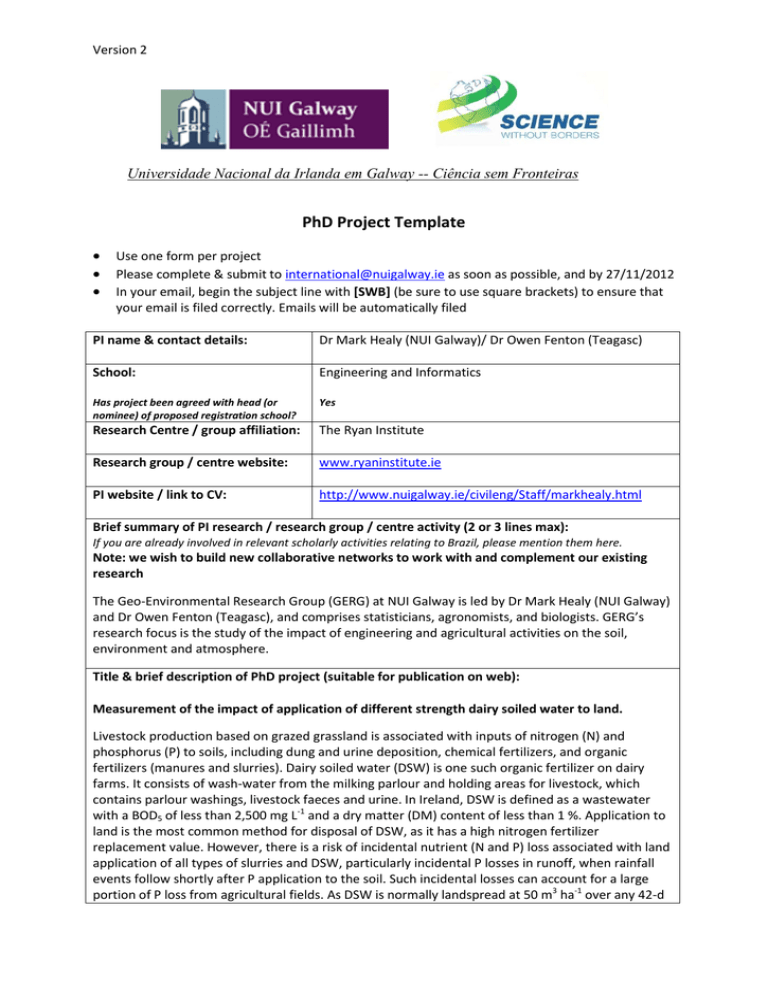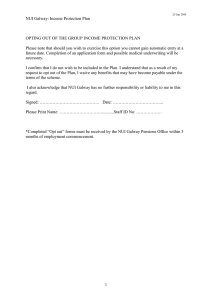PhD Project Template
advertisement

Version 2 Universidade Nacional da Irlanda em Galway -- Ciência sem Fronteiras PhD Project Template Use one form per project Please complete & submit to international@nuigalway.ie as soon as possible, and by 27/11/2012 In your email, begin the subject line with [SWB] (be sure to use square brackets) to ensure that your email is filed correctly. Emails will be automatically filed PI name & contact details: Dr Mark Healy (NUI Galway)/ Dr Owen Fenton (Teagasc) School: Engineering and Informatics Has project been agreed with head (or nominee) of proposed registration school? Yes Research Centre / group affiliation: The Ryan Institute Research group / centre website: www.ryaninstitute.ie PI website / link to CV: http://www.nuigalway.ie/civileng/Staff/markhealy.html Brief summary of PI research / research group / centre activity (2 or 3 lines max): If you are already involved in relevant scholarly activities relating to Brazil, please mention them here. Note: we wish to build new collaborative networks to work with and complement our existing research The Geo-Environmental Research Group (GERG) at NUI Galway is led by Dr Mark Healy (NUI Galway) and Dr Owen Fenton (Teagasc), and comprises statisticians, agronomists, and biologists. GERG’s research focus is the study of the impact of engineering and agricultural activities on the soil, environment and atmosphere. Title & brief description of PhD project (suitable for publication on web): Measurement of the impact of application of different strength dairy soiled water to land. Livestock production based on grazed grassland is associated with inputs of nitrogen (N) and phosphorus (P) to soils, including dung and urine deposition, chemical fertilizers, and organic fertilizers (manures and slurries). Dairy soiled water (DSW) is one such organic fertilizer on dairy farms. It consists of wash-water from the milking parlour and holding areas for livestock, which contains parlour washings, livestock faeces and urine. In Ireland, DSW is defined as a wastewater with a BOD5 of less than 2,500 mg L-1 and a dry matter (DM) content of less than 1 %. Application to land is the most common method for disposal of DSW, as it has a high nitrogen fertilizer replacement value. However, there is a risk of incidental nutrient (N and P) loss associated with land application of all types of slurries and DSW, particularly incidental P losses in runoff, when rainfall events follow shortly after P application to the soil. Such incidental losses can account for a large portion of P loss from agricultural fields. As DSW is normally landspread at 50 m3 ha-1 over any 42-d Version 2 Universidade Nacional da Irlanda em Galway -- Ciência sem Fronteiras period, the existing legislation governing its application only considers volumes but does not consider the potential impact of different strength DSW on surface runoff. This project will measure this and will investigate the efficacy of different chemical amendments for the mitigation of surface runoff losses of nutrients. Tasks involved: Working as part of a research team. Literature search. Characterisation of dairy soiled water. Application of DSW to rainfall simulator runoff boxes and measurement of surface runoff. An investigation of the impact of chemical additions to DSW on surface runoff. Phosphorus stripping from DSW may also be explored. Unique selling points of PhD project in NUI Galway: NUI Galway projects should emphasise features that are not typically available in Brazil – specific equipment, multi-disciplinarity, aspects of structured programme, links with industry, placements, links with other research groups etc. This project would allow the successful candidate the opportunity to work as part a multidisciplinary group within NUI Galway’s environmental engineering facility, which has links in Australia, USA, Finland, France, the UK, and Brazil. The Civil and Environmental Engineering Laboratory, constructed in 2011 at NUI Galway, is a state-of-the-art laboratory and is amongst the most pre-eminent laboratories of its type in Ireland. It is located in the largest engineering building in Ireland. The laboratory has state-of-the-art environmental water quality measurement, microbiological, and gas measurement facilities. GERG is also closely affiliated with Teagasc, Johnstown Castle, which is Ireland’s leading research institute on the rural environment, and which conducts both fundamental and applied research on a wide range of subjects, e.g. nutrient efficiency, water quality. Name & contact details for project queries, if different from PI named above: Please indicate the graduates of which disciplines that should apply: Graduates with a background in Civil/Environmental Engineering, or any natural science subject (soil science, chemistry, hydrology, agricultural science) should apply. Training will be provided by the project supervisor. Ciência sem Fronteiras / Science Without Borders Priority Area: Please indicate the specific programme priority area under which the proposed PhD project fits- choose only one (tick box): Engineering and other technological areas x Please indicate which of the following applies to this project (referring to Science Without Borders arrangements): Suitable only as a Full PhD (Y/N): _ Y____ Available to candidates seeking a Sandwich PhD arrangement (Y/N): __Y___ Suitable for either: __Y___

